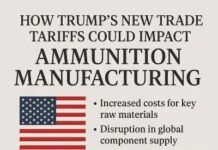Houston, (July 14, 2009)–The ongoing confirmation hearings considering the fitness of Supreme Court nominee Sonia Sotomayor to join the nation’s highest court have generated a lot of commentary related to constitutional issues that gun-owners care about. Here’s a sampling of law-profession comments about her judicial record as it relates to 2nd Amendment, 1st Amendment, and 4th Amendment issues:
Nelson Lund, the Patrick Henry Professor of Constitutional Law and the Second Amendment at George Mason University School of Law, recently published “Anticipating Second Amendment Incorporation: The Role of the Inferior Courts” in the Syracuse Law Review. He was also a law clerk for former Justice Sandra Day O’Connor: “Second Circuit Judge Sonia Sotomayor recently held that the Constitution does not protect the right to keep and bear arms against infringement by state and local governments. Her defenders maintain that she was merely applying settled precedent, which only the Supreme Court itself is authorized to reconsider. This is a half truth that conceals more than it reveals. In the twentieth century, however, the Supreme Court decided a series of cases in which it concluded that most of the rights protected against the federal government by the Bill of Rights are also “incorporated” against the state governments by the Fourteenth Amendment’s Due Process Clause. The Court has analyzed each right separately, but the legal test that eventually emerged focuses on the significance of the right at issue in the Anglo-American tradition of ordered liberty. The Supreme Court has not yet reviewed an incorporation case involving the Second Amendment, but its Second Amendment opinion last year pointedly noted that a due process analysis is now “required” under its twentieth century caselaw. Judge Sotomayor ignored this instruction from the Supreme Court. She decided that her court was not required to perform this due process analysis because the nineteenth century decisions under the Privileges or Immunities Clause had settled the issue. It is not true, however, that Judge Sotomayor was faithfully following precedent. The Supreme Court has never said that the Due Process Clause does not “incorporate” the right to keep and bear arms. That Court has never said that the nineteenth century Privileges or Immunities Clause cases foreclose due process analysis. Nor has it ever said that the lower courts are supposed to “wait” for the Supreme Court to rule on due process incorporation. The Supreme Court’s twentieth century incorporation cases are the most relevant precedents, and Judge Sotomayor completely ignored them.”
ARTHUR LEAVENS, professor at the WESTERN NEW ENGLAND COLLEGE School of Law: “Judge Sotomayor has already weighed in on one hot-button issue that may well soon come before the court, and that is the reach of the newly resurrected Second Amendment right to bear arms. In Heller, the Supreme Court held that the Second Amendment protected an individual’s right to bear arms in his or her home, striking down Washington, D.C.’s very restrictive gun ban. However, since Washington, D.C., is a federal enclave, Heller left unresolved the important question of whether the Second Amendment applies to the states (as opposed to just the federal government). This question, technically whether the Second Amendment’s protections are incorporated into the 14th Amendment’s due-process protections and are thus applicable to the states, is open. If the Supreme Court were to hold that the Second Amendment is not incorporated into the 14th Amendment’s due-process clause, it would leave the states and localities free to ban guns as they see fit, considerably reducing the impact of Heller. In Maloney v. Cuomo, decided this past February, the Second Circuit held that the Second Amendment’s protections are not incorporated into the 14th Amendment and thus do not apply to the states. Judge Sotomayor joined in that opinion.” Leavens is based in Springfield, Mass.
ASHLEY HORNE, federal policy analyst for FOCUS ON THE FAMILY ACTION: “With President Obama’s nomination of Judge Sonia Sotomayor to the Supreme Court, the country is again confronted with the question: What type of justices should sit on the court? Americans overwhelmingly support justices who base decisions on the law and the Constitution, practice judicial restraint and believe judges should never make policy. From what we know about her, though, Judge Sotomayor considers policy-making to be among a judge’s roles, no matter what the law says. She disregards the notion of judicial impartiality, even stating that as a Latina woman with her life experience, she should ‘more often than not’ reach a better conclusion than a ‘white male who hasn’t lived that life.’ The president’s professed desire for judges with ’empathy,’ rather than impartiality, might deny the country what the Founding Fathers intended and wrote into the Constitution — judges who dispense justice without regard for the status of any party that comes before them.” Horne is based in Colorado Springs, Colo.
JOHN F. BOWEN, partner at FORD & HARRISON LLP’s Minneapolis office: “President Obama’s nomination of Sonia Sotomayor to the U.S. Supreme Court to replace retiring Justice David Souter is a particularly divisive choice, in light of Sotomayor’s reputation as a far-left activist judge throughout her judicial career. If confirmed, however, Sotomayor’s elevation to the Supreme Court from the U.S. Court of Appeals for the Second Circuit will not likely change the ideological composition of the court, because she would replace another liberal voice in Justice Souter. Despite Sotomayor’s qualifications, most conservatives will likely challenge her nomination because of her liberal approach to constitutional issues and questions of law. For example, her statement that the Courts of Appeal are where policy is made reflects an almost callous disregard for the framework of the Constitution and the separation of powers between the executive, legislative and judicial branches of the federal government. Moreover, the recent controversial decision in Ricci v. Destefano regarding the New Haven firefighters — essentially upholding reverse discrimination against whites — suggests that she favors reaching a particular policy outcome in crafting judicial decisions, rather than the application of the rule of law.”
PATRICIA LEARY has been teaching law for the last 20 years and is a distinguished professor at WHITTIER LAW SCHOOL. She is an expert in constitutional law and women and the law. Leary can discuss the term “judicial activist” being used to describe Judge Sonia Sotomayor: “The law is made of words. Those of us who teach and study law care about words a great deal. Words can be used to clarify and enlighten, or they can be used to obscure and distract. If I were granted three wishes for this confirmation process, I would use one of them to banish the deliberately inflammatory and meaningless term ‘judicial activism’ from the national conversation. Let’s use this opportunity to begin and continue a deeper dialogue about law and the role of the United States Supreme Court in our system of government.” Leary is located in the Los Angeles area.
STEVE MILLOY, lawyer, publisher of JUNKSCIENCE.COM and author of “Green Hell: How Environmentalists Plan to Control Your Life and What You Can Do to Stop Them”: “Supreme Court nominee Sonia Sotomayor represents a potential threat to U.S. consumers and the economy, in terms of energy and the environment, and in terms of site pollution, such as at shooting ranges, or in broader restrictions on ammunition. She sided with extreme environmental groups who had sued the EPA because the agency permitted cost-benefit analysis to be used in the determination of environmental protection technology for power plants. Fortunately, Judge Sotomayor’s decision was overturned by the Supreme Court this past April. Had the EPA been required to abide by Judge Sotomayor’s decision, American consumers would have been forced to pay billions of dollars more in energy costs every year. Judge Sotomayor seems to lack the common- sense realization that the benefits of environmental regulation must outweigh its costs — a position with ominous implications, given the nation’s present rush toward cap-and-tax global warming regulation.” Milloy is based in Washington, D.C.

























